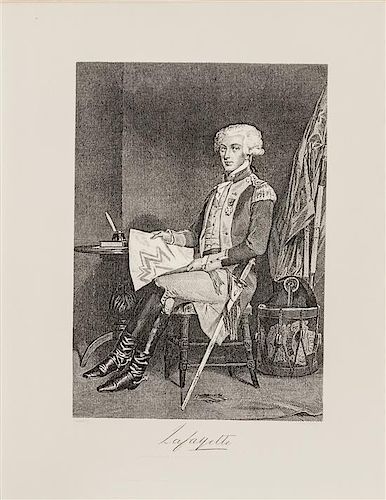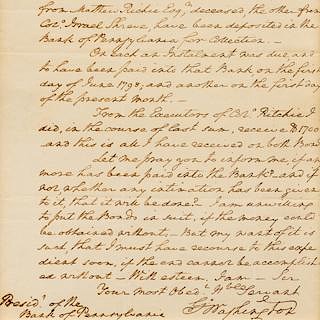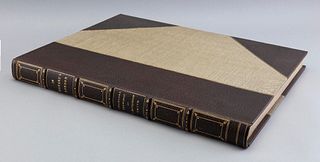* LAFAYETTE, Marie Joseph Paul Yves Roch Gilbert du Motier, Marquis de (1757-1834). ALS ("Lafayette"), in English, to James M
Lot 426
About Seller
Hindman
1338 West Lake Street
Chicago, IL 60607
United States
Recognized as the Midwest's leading fine art auctioneers, Hindman Auctioneers has built a worldwide reputation based on a full service approach to the auction business tailored to meet the individual needs of our clients. Coming from a variety of educational backgrounds, specialists bring years of e...Read more
Categories
Estimate:
$4,000 - $6,000
Absentee vs Live bid
Two ways to bid:
- Leave a max absentee bid and the platform will bid on your behalf up to your maximum bid during the live auction.
- Bid live during the auction and your bids will be submitted real-time to the auctioneer.
Bid Increments
| Price | Bid Increment |
|---|---|
| $0 | $25 |
| $500 | $50 |
| $1,000 | $100 |
| $2,000 | $250 |
| $5,000 | $500 |
| $10,000 | $1,000 |
| $20,000 | $2,500 |
| $50,000 | $5,000 |
| $100,000 | $10,000 |
About Auction
By Hindman
May 1, 2018
Set Reminder
2018-05-01 11:00:00
2018-05-01 11:00:00
America/New_York
Bidsquare
Bidsquare : Fine Books and Manuscripts
https://www.bidsquare.com/auctions/hindman-auctions/fine-books-and-manuscripts-3113
Hindman Bidsquare@hindmanauctions.com
Hindman Bidsquare@hindmanauctions.com
- Lot Description
* LAFAYETTE, Marie Joseph Paul Yves Roch Gilbert du Motier, Marquis de (1757-1834). Autograph letter signed ("Lafayette"), in English, to James Monroe. Paris, 8 January, [c.1811-1817?].
1 page, approximately 5 1/2 by 6 in., creased at folds, minor marginal loss at upper corner, pinhole at upper left corner, some paper mounting remnants on verso.
A fine letter from Lafayette to Monroe, who was probably Secretary of State at the time, enquiring if he has made any progress in helping with his financial difficulties.
"Permit me to inquire whether you have Received a Letter from me Relative to the pecuniary Business, of great moment to me, you Had Kindly undertaken to Manage, and whether any answer from you on this subject Has Ever been sent to me, General Armstrong, or Mr. Parker? The Affair itself and my situation Respecting it are so well known to you that I Have only to add my affectionate Respects to Mr. and Miss Monroe and the expression of my old and everlasting friendship. Lafayette." As a postscript he adds: "We are waiting for the Agricultural Book two Vol you Have promised to send to our friend Parker."
As a result of the French Revolution, Lafayette spent from 1792 until late 1799 in prison or exile. His wife Adrienne narrowly avoided execution during the Reign of Terror and was finally released from prison as a result of Monroe's efforts while he was serving as American Minister Plenipotentiary to France. Returning to France a free man in 1799, Lafayette was financially ruined. He received a monetary grant while he was imprisoned, which was made in part because he accepted no payment for his services to the Continental Army during the Revolution. In 1803, wishing to do more for Lafayette, Congress granted him over 11,000 acres in the Northwest Territory, but in April of that year the Louisiana Purchase was acquired, and in 1804 the grant was authorized to be made in the new territory. The turmoil of the Napoleonic Wars in Europe and Lafayette's borrowing of considerable sums against his land grants meant the Louisiana lands would have to be sold to repay his debts. The matter was complicated by conflicting claims on some of the land, and dragged on for many years while Lafayette remained in France. He enlisted various American friends, Monroe among them, to assist him in theses matters. It was during Monroe's presidency and partly at his invitation that Lafayette made his triumphant farewell tour of the United States in 1824-1825. In this letter he probably refers to General John Armstrong (1758-1843), who served as a Minister to France and as U. S. Secretary War.
Estimate $ 4,000-6,000
Property from the Robert L. McKay Collection, North Tustin, California
- Shipping Info
-
For more information regarding shipping please visit Leslie Hindman Auctioneers' Shipping and Packing page.
-
- Buyer's Premium



 EUR
EUR CAD
CAD AUD
AUD GBP
GBP MXN
MXN HKD
HKD CNY
CNY MYR
MYR SEK
SEK SGD
SGD CHF
CHF THB
THB











